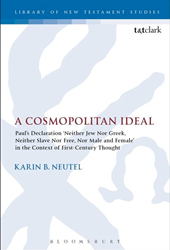Publicatie 'A Cosmopolitan Ideal' (dr. K.B. Neutel)
Wat bedoelt de nieuw-testamentische auteur Paulus als hij verklaart, ‘er is geen Jood of Griek, geen slaaf of vrije, geen man en vrouw, want jullie zijn allemaal één in Christus’ (Galaten 3:28)? Hoewel veel moderne lezers deze woorden begrijpen als een uitspraak over menselijke gelijkwaardigheid, laat Karin Neutel in haar recent verschenen boek zien dat ze ideeën over een ideale of utopische gemeenschap weerspiegelen. Met deze uitspraak neemt Paulus deel aan de toenmalige culturele discussie over een dergelijke gemeenschap.
De paren die Paulus in deze uitspraak bij elkaar brengt speelden alle drie een rol in voorstellingen over een ideale wereld. Deze voorstellingen werden beïnvloed door kosmopolitanisme: het filosofische idee dat alle mensen en volken tot één homogene samenleving behoren. Door Paulus’ gedachten te zien in de context van deze idealen, wordt zijn houding tegenover elk van de drie paren duidelijk, zoals die naar voren komt in zijn brieven. Zijn denken over het paar Jood-Griek moet gezien worden als een vorm van kosmopolitanisme dat gebaseerd is op de Joodse verwachting dat in de eindtijd alle volken uiteindelijk de God van Israël zullen erkennen.
Paulus’ houding tegenover slaven en vrije mensen is deel van een bredere tendens om de afwezigheid van slaven te zien als kenmerkend voor een utopische gemeenschap. Het derde paar, ‘man en vrouw’, bevestigt de heersende gedachte dat het huwelijk geen plaats heeft in een ideale groep, omdat het afleidt van het gemeenschappelijk belang. Net als andere utopische denkers meende Paulus dat een ideale gemeenschap gebaseerd moest zijn op wederzijdse steun en egalitaire relaties.
Bestellen
Het boek was te bestellen via de webshop van Bloomsbury.
Meer nieuws
-
06 januari 2026
Geschiedenis dichterbij brengen
-
10 juni 2025
RUG en Rijksmuseum tekenen samenwerkingsovereenkomst

